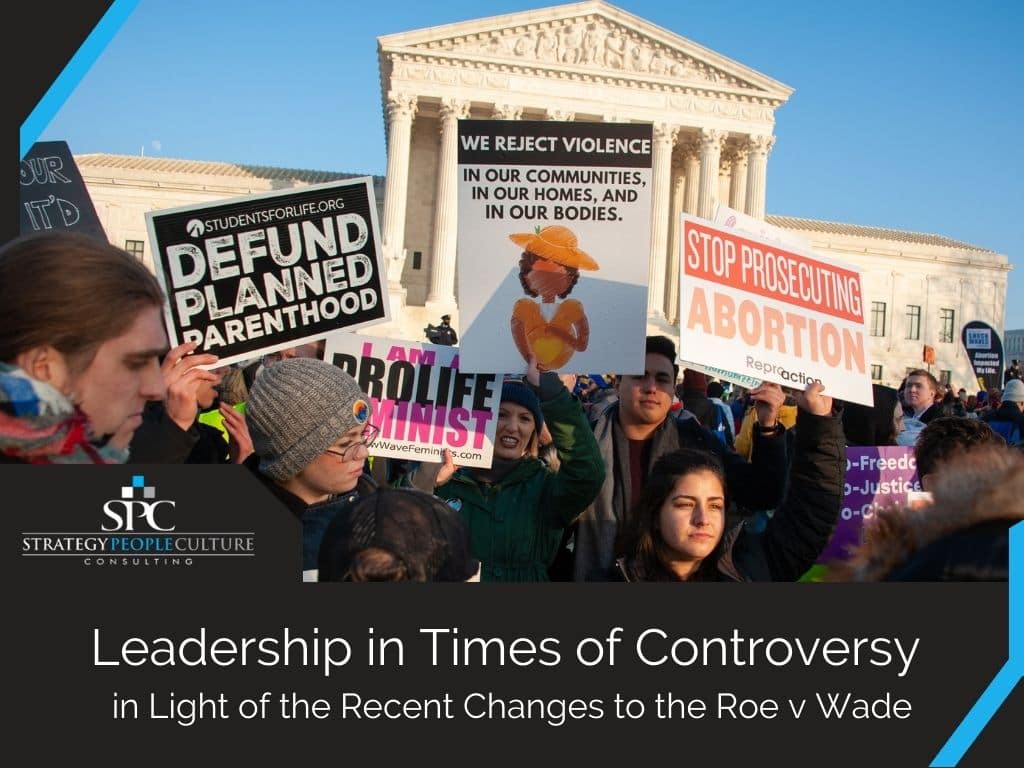Leadership in Times of Controversy in Light of the Recent Changes to the Roe v Wade

The overturning of the Roe v Wade ruling from 1973 by SCOTUS (the Supreme Court of The United States) ended a 50-year constitutional right to abortion. Of course, the formal decision became a bit of a formality after the decision was leaked nearly two months prior. What does this rule of law mean for you in business?
Likely this has led to people on your team immediately sharing personal feelings, emotions, political viewpoints, distracted employees, more workplace chatter impacting production, and potentially much more. Controversial decisions on topics such as abortion create potential challenges and present an opportunity for leaders.
Differentiating Your Opinion From Your Role as a Leader
A vast majority of people have strong feelings one way or the other. Some believe abortion should be completely illegal regardless of circumstance. Others believe abortion should be a freedom of choice, and women should have a right to choose when it comes to the reproductive rights of the human body, regardless of circumstance. Others fall somewhere in between depending on health care risks to the woman, whether rape was involved, or the gestational age of the fetus. Regardless of where you fall in this spectrum, you likely have employees who feel differently.
What Is Your Role as a Leader?
Undoubtedly the political end of the conversation will include discussions around former President Donald Trump, current President Joe Biden, along with Supreme Court Justices Clarence Thomas, Sonia Sotomayor, Elena Kagan, Samuel Alito, Brett Kavanaugh, Chief Justice John Roberts, Neil Gorsuch, Stephen Breyer, and Amy Coney Barrett. People will often talk about who was in the majority opinion and who was in the dissenting opinion, and whether this is because of Republican or Democrat court-appointed Justices. Further discussions go down the route of religious-based perspectives, constitutional rights, should Congress create new legislation, responsibilities around pregnancy, and much more.
For some, the policies and politics around abortion, the news stories, privacy rights, etc., are interesting, but is all of this why you are at work? Does this discussion enter the process during the job application and interview process? As a leader, when you are deciding to hire someone, is this typically part of the thought process? Clearly, in most cases, the answer is no.
As a leader, you must understand people as humans and, as such, will be impacted by the news around them. Accepting and balancing this with your responsibility will help your team focus on the task at hand respectfully, making them less distracted from issues from the world and outside the scope of someone’s job.
Harvard Business Review explained that “when the leader succeeds, it will be because he [or she] has learned two basic lessons: Men [and women] are complex, and men [and women] are different. An effective leader is accountable for bringing together people in their organization to maximize its purpose and goals. The common connection of your workforce is the work, not the personal views, perspectives, and ongoings of the world outside of the why you were hired. While some exceptions, such as Planned Parenthood or National Right to Life Committee, have purposes focused on points of view on abortion-related issues, most businesses are about providing a product or service of some other kind. Your role as a leader is about maximizing the effectiveness of that product or service to make your company as successful as possible, based on the definition set by the owner, CEO, etc.
How Do You Maximize Organizational Effectiveness in Light of Controversial Conversations?
This response could be a multi-volume book series. Keeping it simple, a few helpful hints would be:
- Leaders need people to follow them – Such a simple yet often lost perspective. How you communicate, engage, and act towards the people you lead will dictate whether they want to follow you instead of listening to you exclusively because you are their boss.
- Show empathy and understanding – Recognize some of your employees, colleagues, and other leaders in your organization may not be able to control their feelings or emotions. Empathizing with someone’s personal challenges or excitement over an issue is important as each person is different.
- Be supportive – Give people the space they need. If someone is overwhelmed with emotion and it is impacting their ability to be effective at work, displaying good leadership may not just be punishing someone and, conversely, may not be just accepting lower performance. Other alternatives, such as allowing them to take some time off, work more independently than normal, etc., may be ways to enable the person to focus more clearly.
- Be clear and communicate – People are hired to do a job, not let their personal life views interfere with their jobs. That said, people are also human and, as a result, have feelings, emotions, and reactions. Helping remind people of the organization’s purpose, the expectations of respecting colleagues in the workplace, and focusing on the job at hand may be helpful in focusing your team.
- Mitigate divisive behavior – Employees making others feel worse about themselves or intimidated because someone has different viewpoints about them is counter-productive to workplace objectives. The Wall Street Journal talked about the importance of building a team. People can have different opinions and still be an effective team, and fostering that outcome is part of your role as a leader.
- Be authentic – You are allowed to be a human being too and the more your people see that, the greater the likelihood of them respecting you and being willing to follow. It is okay to let people see that external issues may affect you as well and help you bridge the misperception that you are inhumane simply because you are trying to get everyone at work to focus on work.
Some Examples
To delineate different styles and approaches, consider the respective approaches of Manager A, Manager B, and Manager C below:
Manager A – Upset about the decision to overturn Roe v. Wade as she believes it is a fundamental right of women to make choices when it comes to this issue. Manager A goes and tells all of her employees how horrible that decision is, and SCOTUS is nothing but a political tool, and our country is falling apart.
Manager B – Overjoyed with the decision to overturn Roe v. Wade as she believes it is murder to abort an unborn fetus. Manager B goes and tells all of her employees how the country is finally getting its act together and doing the right thing and preventing people from killing the innocent.
Manager C – Has strong feelings and sends the following communication to her team. “Dear team. I understand the recent SCOTUS decision may cause emotions and strong feelings for some of you, regardless of your personal viewpoint. If you need space or extra time away from work, you have my support. Please remember, regardless of your point of view, others may disagree. That does not change the fact that we are a team here at XYZ company, and we need to ensure we support everyone to be the best they can be at work. I have my personal opinions and feelings about this decision. It is our responsibility to ensure we are not making colleagues who may have different points of view uncomfortable at work.”
If you were a “pro-life” believer, how would you feel about your Manager if your Manager was Manager A? Would that potentially impact your interest or desire to go the extra mile for Manager A?
If you were someone who had an abortion in the past and believed it was the right decision for you, how might you feel about Manager B? Would that potentially impact your mindset at work?
If you were reporting to Manager C, what message are you getting? There is no such thing as a perfect leader; however, doing your best to be your best is critical, especially in times and situations that could create discord and controversy, impacting the effectiveness of your team.
Executive Coaching as a Resource
At Strategy People Culture, we have been helping leaders for over a decade to be more effective as leaders. If you know someone you believe could benefit from having a certified and seasoned executive coach privately challenge a leader’s thoughts and support their growth, don’t hesitate to contact us at info@strategypeopleculture.com or at (833) ROCK – SPC.


